July 16th – Lesson 11 of work with the novels
Today I want you to look at a couple of shots from the first „Hunger Games“ movie.
Task 1: In comparision to the stills from „Into the Wild“ – find three adjectives to define the difference.
Task 2: Looking at filmstills 1-4 – what do they tell you. Try to say it precisely in one sentence each.
Task 3: What do filmstills 5 and 6 have in common? Why are they used? How do they work for the viewer?
Task 4: What message is conveyed by fieldsizes in stills 7 & 8? In general – point of view is central in almost all of the stills. What does that implicate?
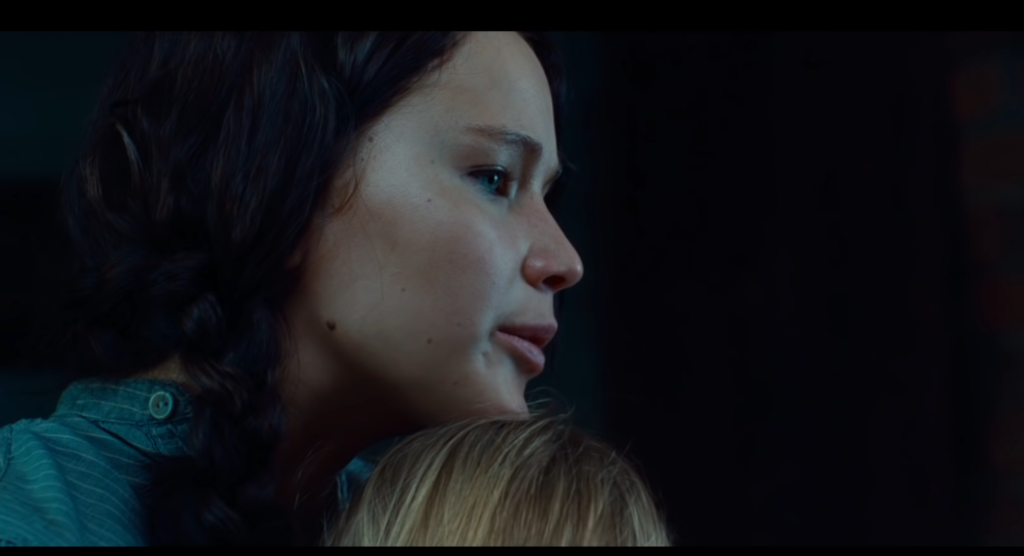
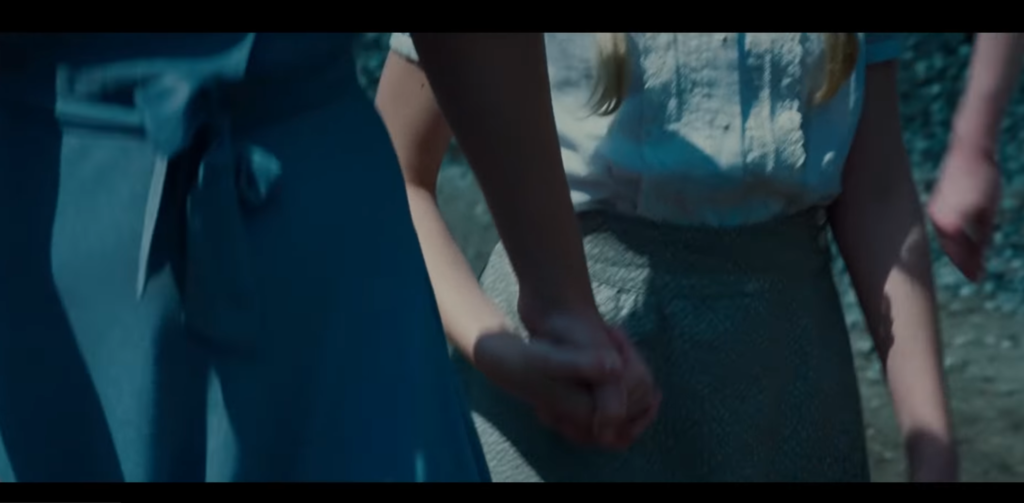
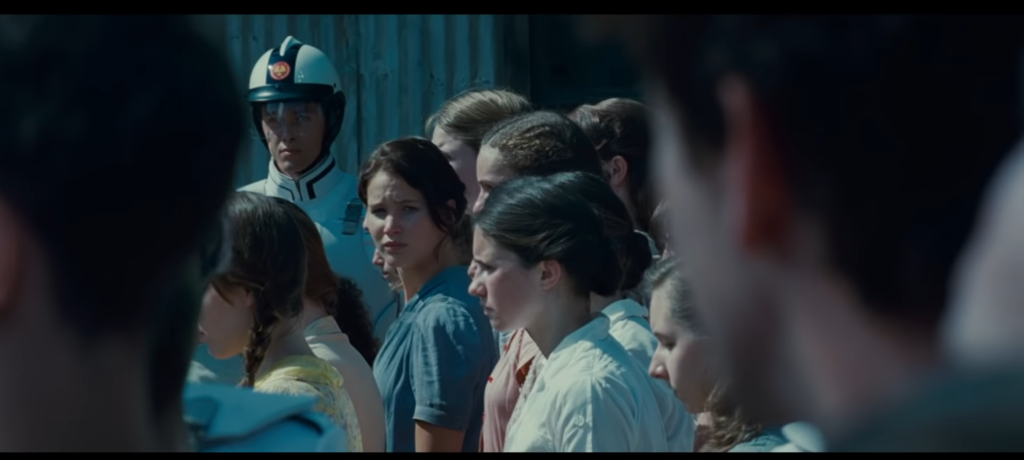
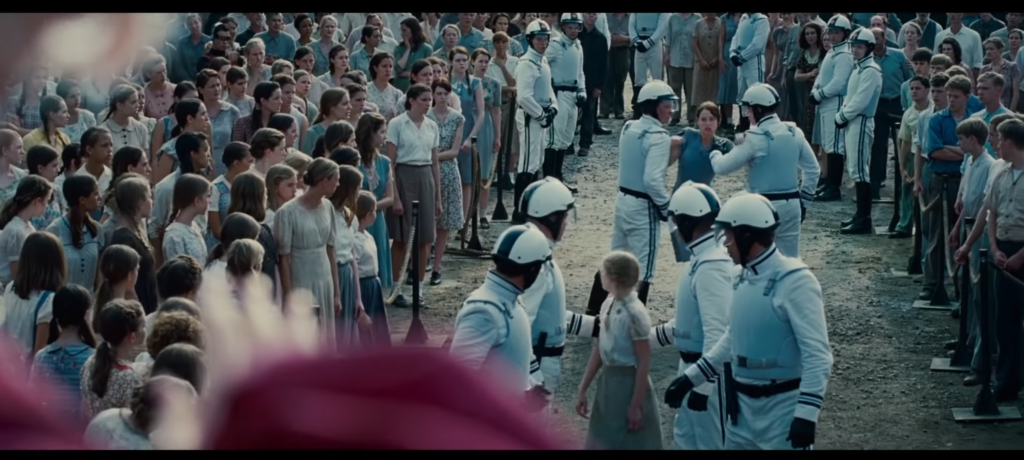
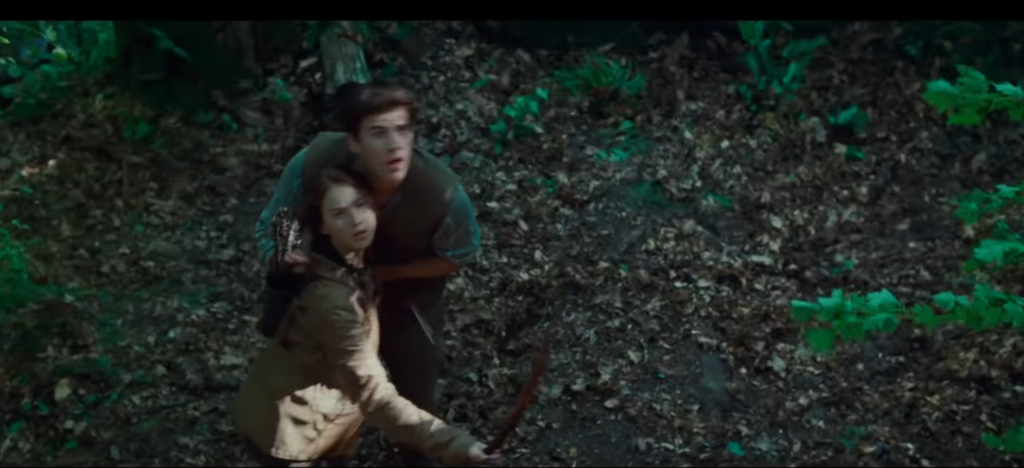
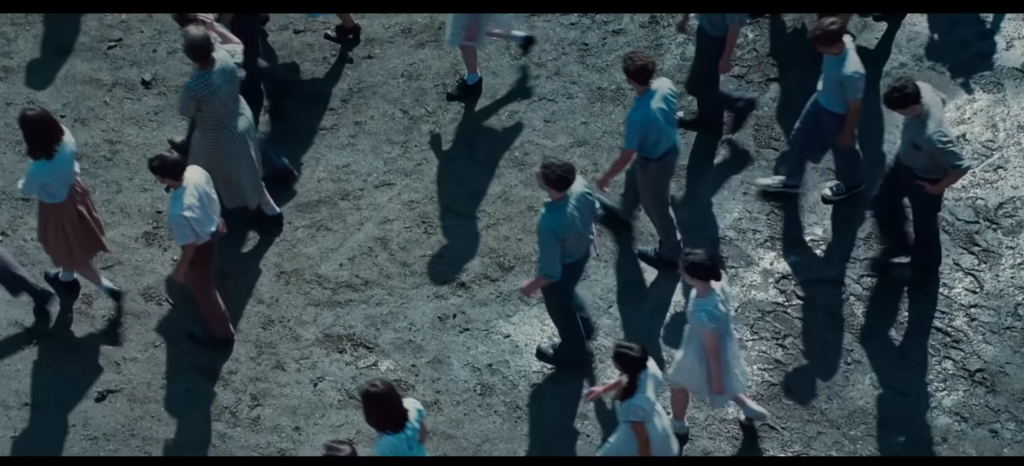
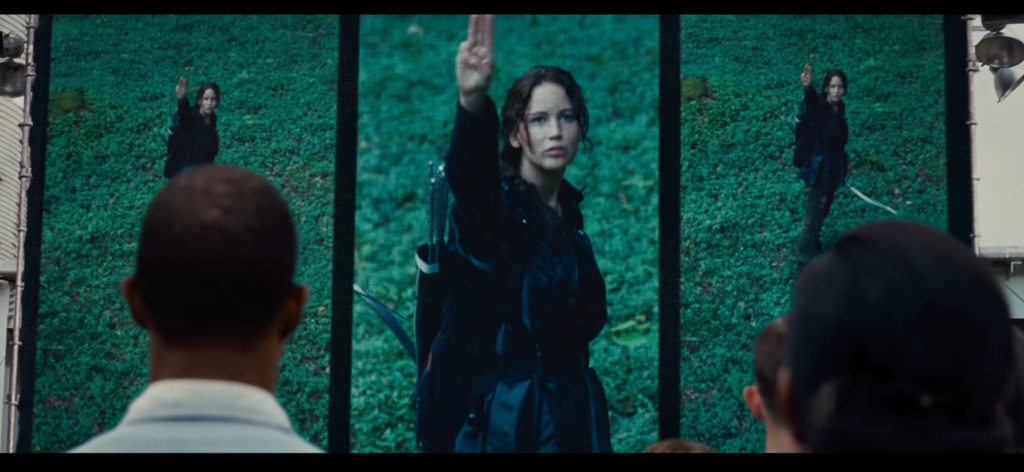
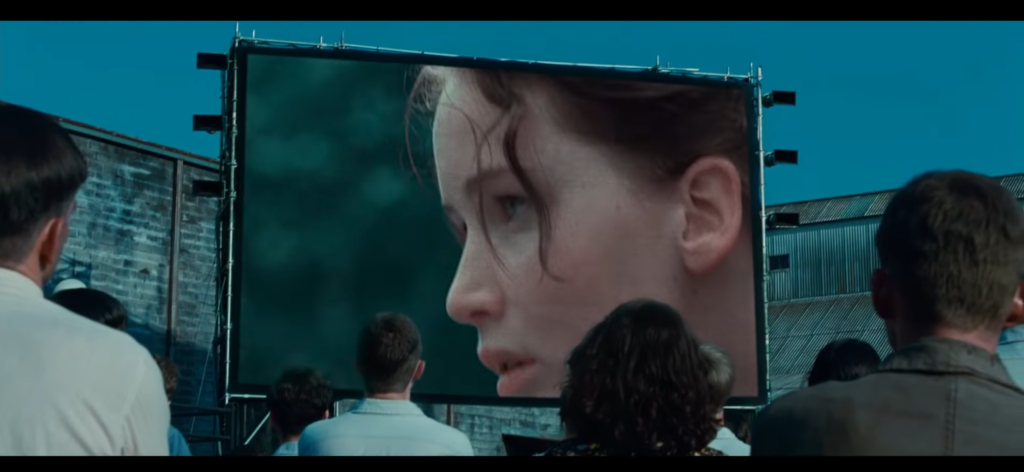
See you Monday! Take care!
July 14th – Lesson 10 of work with the novels
Today I would like you to get a little into the terminology of film analysis. Following you find 4 pdfs, 3 of them focusing on technical terms, the 4th dealing with „suspense“.
Please work through the first two files. Then look at the pictures you will find here. Make sure you find the correct terms to identify each „shot“.
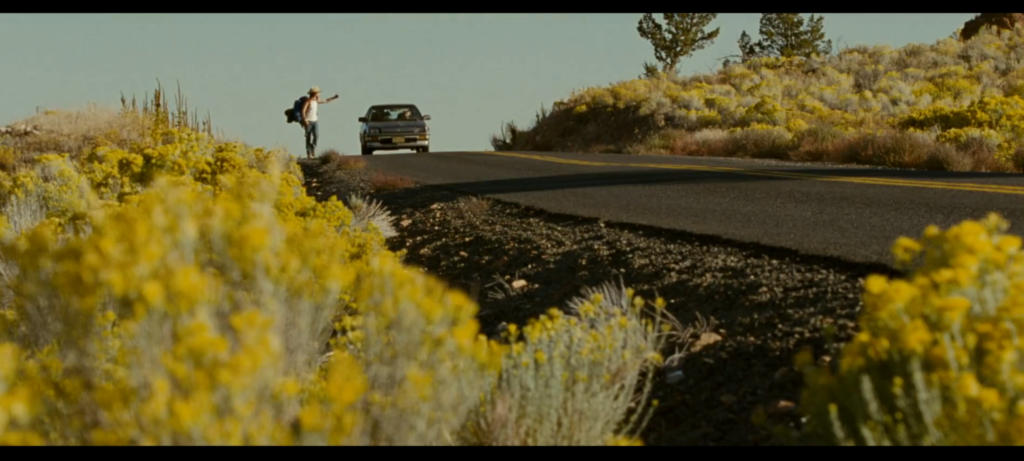
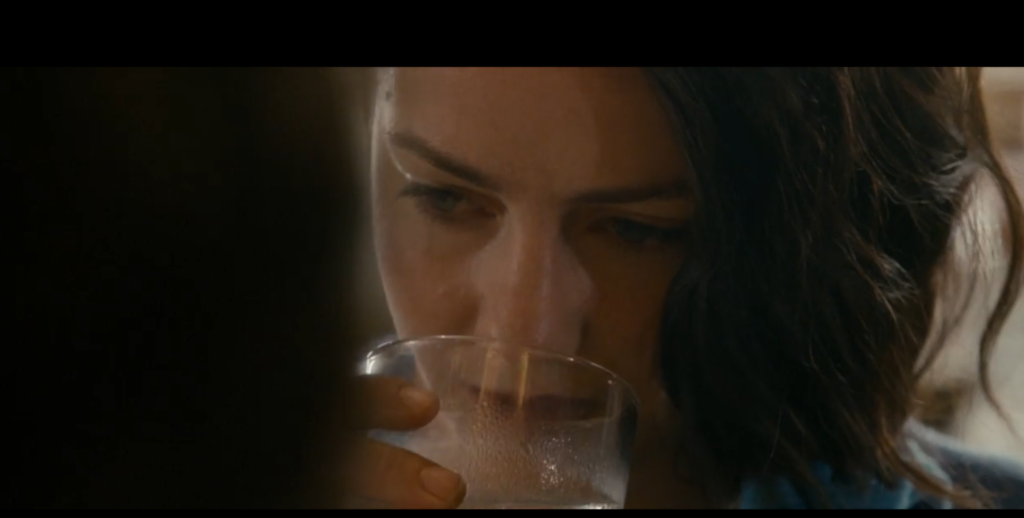
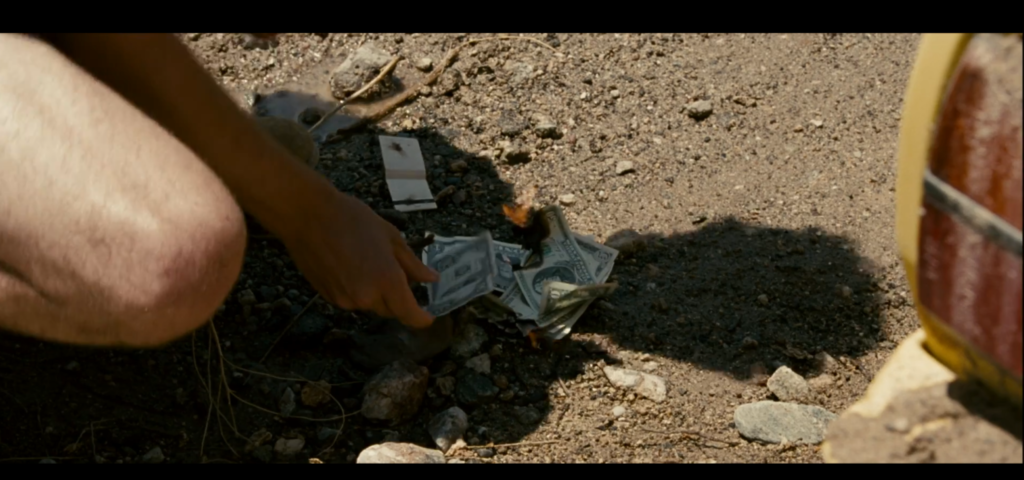
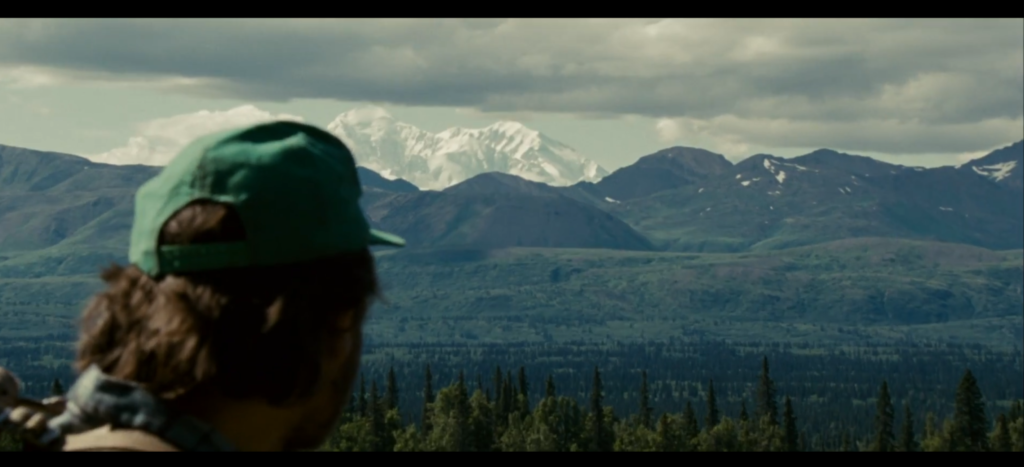
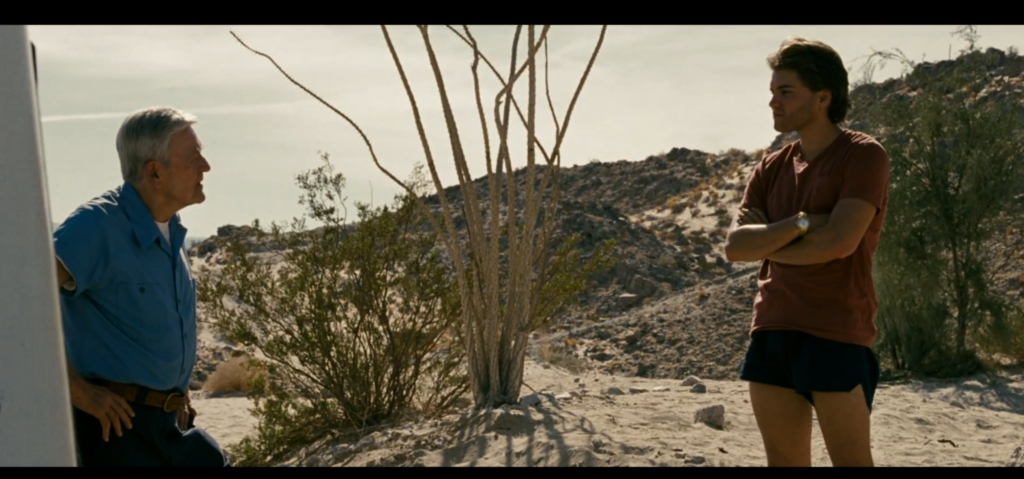
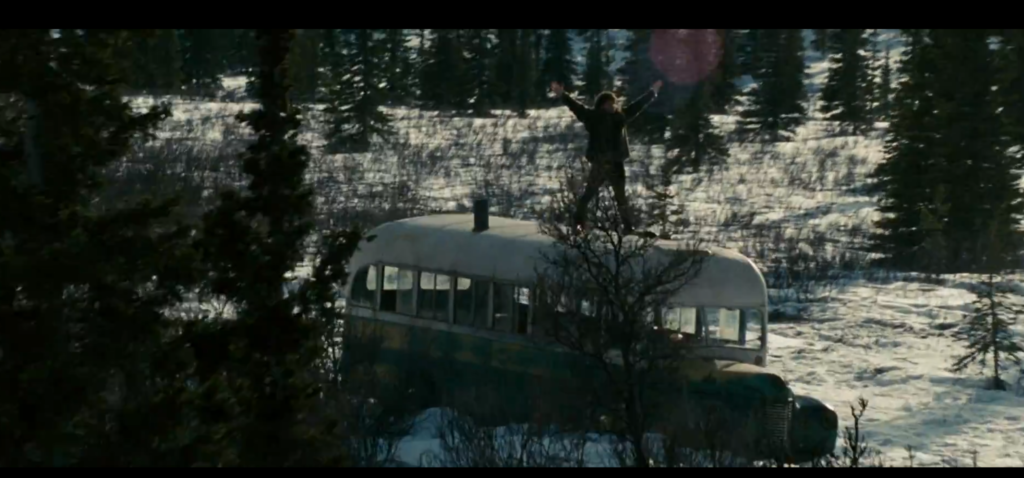
Now: Choose one of the filmstills and describe it in detail (remember rules of describing a picture/ image). Interpret the meaning/ „message“ of the single shot, too.
Please write a neat text and hand it in.
July 13th – Lesson 9 of work with the novels
We are not watching the „Hunger Games“ in class. That is why everyone in the group does today’s tasks about the Hunger Games, even if you have read „Into the Wild“.
The Hunger Games: Listen to this song on youtube and read the lyrics https://www.youtube.com/watch?v=Ijy-ZcV3PH4
Think about the lyrics in this song and jot down your ideas about the criticism in this song.
How is this criticism connected with the world depicted in „The Hunger Games“? What is a major difference between the world of Panem (which is a dystopian society) and the US reality?
Do this matching exercise next:
Now look at the worksheet (and the vocab going with it) and collect the aspects that make Panem a „Dystopian society“.
For the ones who have not got the books here are three text passages you can use.

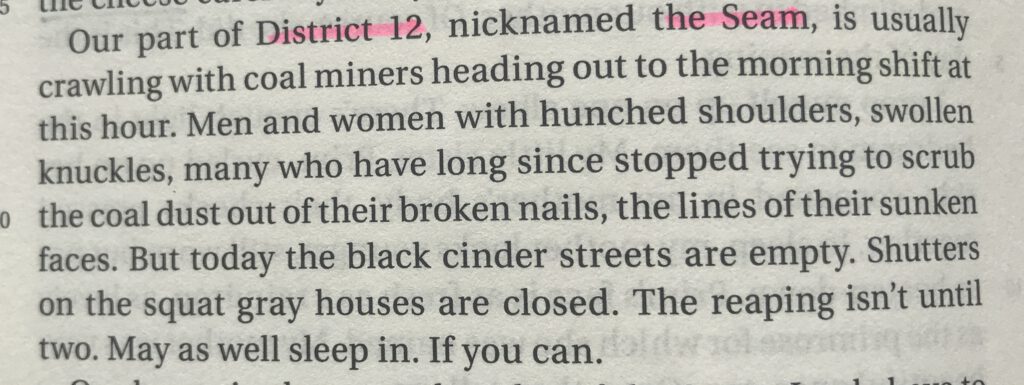
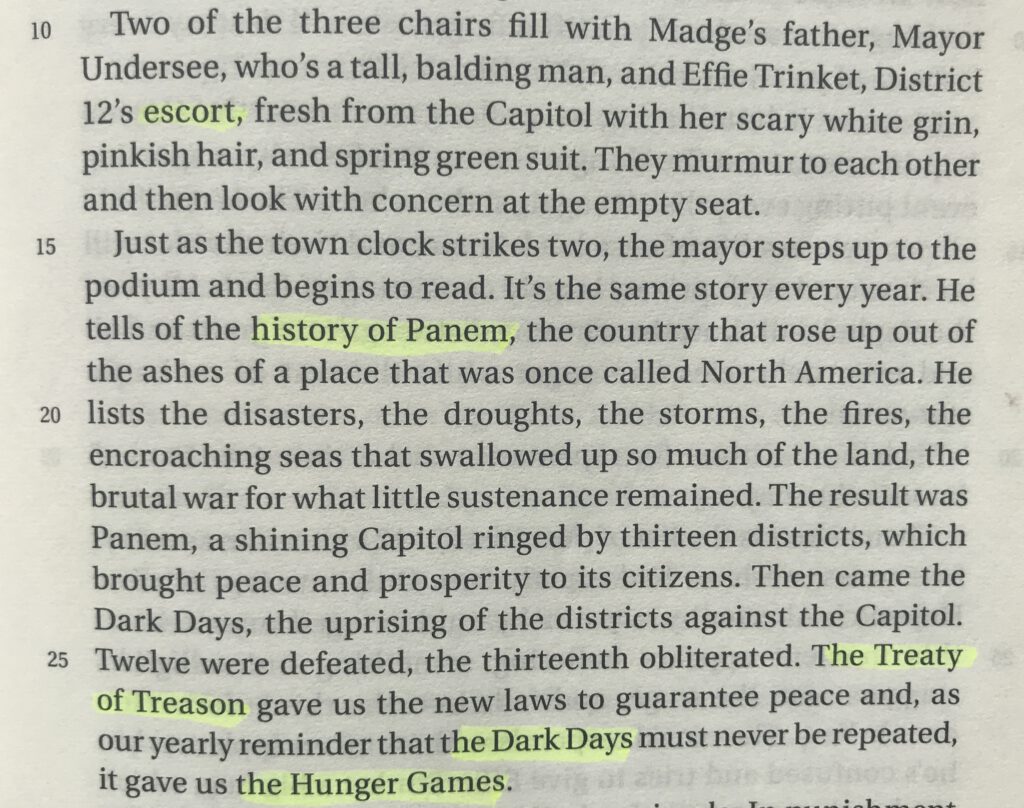
Finally: Do some research on human rights.
What are human rights?
Who do they apply to?
Which human rights are there? Go to https://www.un.org/en/universal-declaration-human-rights/index.html and skim the 30 articles. Which do you feel are the most important human rights? Make a ranking list and think about your choice!
Talk to you here tomorrow!
July 8th 2020 – Lesson 7 of work with the novels
Today you work with themes, motifs and symbols. Also you look at names and people mentioned in „Into the Wild“.
What is a theme? – In a work of art the term refers to the topics that are covered.
What is a motif? – a dominant or recurring idea in a work of art.
What is a symbol? – something/ a sign that is used to represent something else.
The Hunger Games:
- Please look at the collection of themes and motifs in the upload. Arrange them into a concept map using arrows or double arrows to reveal interrelations.
- Make a choice of three and develop a mind-map for each including all relevant information and at least one quote
- Names: In the collection of names below – find out the meaning of each one. Choose 3 names and shortly explain why they are „telling names“.
Katniss Everdeen – Primrose – Catnip – Rue – Gale – Glimmer – Thresh – Clove – Foxface – Cinna (cinnamon/cinnabar) – Peeta (peat) – Effi Trinket – Caesar – Claudius – Cato – President Snow
Into the Wild:
- Please look at the collection of themes and motifs in the upload. Arrange them into a concept map using arrows or double arrows to reveal interrelations.
- Make a choice of three and develop a mind-map for each including all relevant information and at least one quote.
- people: The collection of people’s names below include the writers Chris admires and people Krakauer implicitly compares Chris with- find out relevant dates of their lives and two major details about them. Choose 3 persons and shortly explain why they are either relevant to Chris or why Krakauer uses them as reference figure.
Henry David Thoreau – Leo Tolstoy – Jack London – Boris Pasternak – Everett Ruess – Carl McCunn – John Mallon Waterman – Victor Rossellini
See you here on Friday.
July 3rd 2020 – Lesson 4 of work with the novels
First work on the Vocab matching for your novel:
The first one has nouns from „Into the Wild“
The second one has adjectives referring to positive and negative family relations:
Task:
Into the Wild: Look again at chapters 11 and 12 and collect details about Chris as a child, as a teenager and as a student. Who are the people he is close to and why? What are his focuses. Try to use some of the nouns from the matching exercise as a start to look more intensively at his personality.
The Hunger Games: Look again at two scenes in the novel that change the way Katniss is perceived by the public: The girl on fire – for that also listen to a song by Alicia Keys with the same title. And the scene when Rue dies (p.198-205). Collect more adjectives to describe Katniss and also quotes from the novel.
July 1st 2020 – Lesson 3 of work with the novels
Here is a link that takes you to a quiz about „Into the Wild“: https://www.cliffsnotes.com/literature/i/into-the-wild/study-help/quiz
And this is a quiz about the novel „The Hunger Games“
And another one: https://www.cliffsnotes.com/literature/h/the-hunger-games/study-help/quiz
After you have done the quizzes, use the internet to find out more to answer the following question:
What made the book „Into the Wild“ such a success?
Look at this quote from an online article: Reading “Into the Wild,” it’s easy to understand why it has captured the imaginations of so many and inspired journeys into the wilderness. While certainly a story of tragedy, it’s also a compelling and thoughtful look at why we often turn to nature for answers to life’s questions.
Here you find the full article: https://www.treehugger.com/why-are-we-still-talking-about-chris-mccandless-4864060
What are reasons for the striking success of „The Hunger Games“?
Here is just one link to an analysis you can work through and find out which reasons the author gives: https://medium.com/read-watch-write-repeat/why-the-hunger-games-is-so-popular-5eb9d2994f85
Take notes on your research and publish your results to share with the others in the collaboration space!
May 27th 2020 – Lesson 7 of split class trainnig
Only one person has done yesterdays tasks and handed it in. That means this person can relax today and the others work on Monday’s and Tuesday’s tasks. I am NOT willing to work my „behind“ off for an ignorant bunch sitting at home doing nothing. So before there is anything new, you have to prove you are worthwhile my effort. Find a way to do that!
May 26th 2020 – Lesson 6 of split class training
If you forgot to work here yesterday, please do tasks of May25th! If you have worked on those tasks yesterday than move on to the tasks posted under May 22nd!
May 25th 2020 – Lesson 5 of split class training
Now being back home this week your first tasks mean work the others have done and you have not being in the classroom:
- Answer these two questions going with the „extreme poverty text“ in written form: a) Show how and why poverty has declined worldwide since the 1990s. b) Explain whether it is likely that the ongoing progress will continue.
- Now watch this video in which Anna Rosling-Rönnlund presents the idea of „Dollar Street“: https://www.gapminder.org/videos/everyone-lives-on-dollar-street/
Now you please do two vocab exercises:
See you back here tomorrow!
May 22nd 2020 – Lesson 4 of split class training
Today you will work with the Dollar-Street tool. I want you to discover similarities and differences like the ones Anna Rosling-Rönnlund points out in her video by yourself!
https://www.gapminder.org/dollar-street/matrix
Please do the following:
- You have probably realised by now that you live on level 4. There are many other countries in the world in which people do so.
- Make a Quick Tour to find your way around on the page!
- Please make a choice of three countries around the world (preferably on different continents) in which you think people live on an equal level.
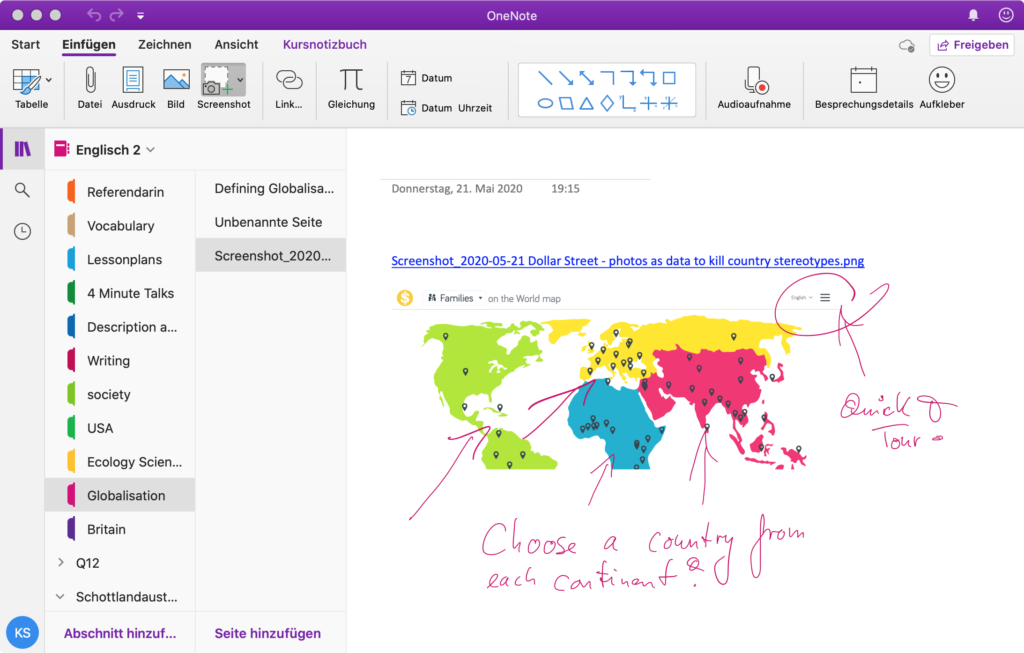
- Now open up the box of countries by clicking on the arrow behind „the World“
- Then make your choice of three in the option box and click ok.
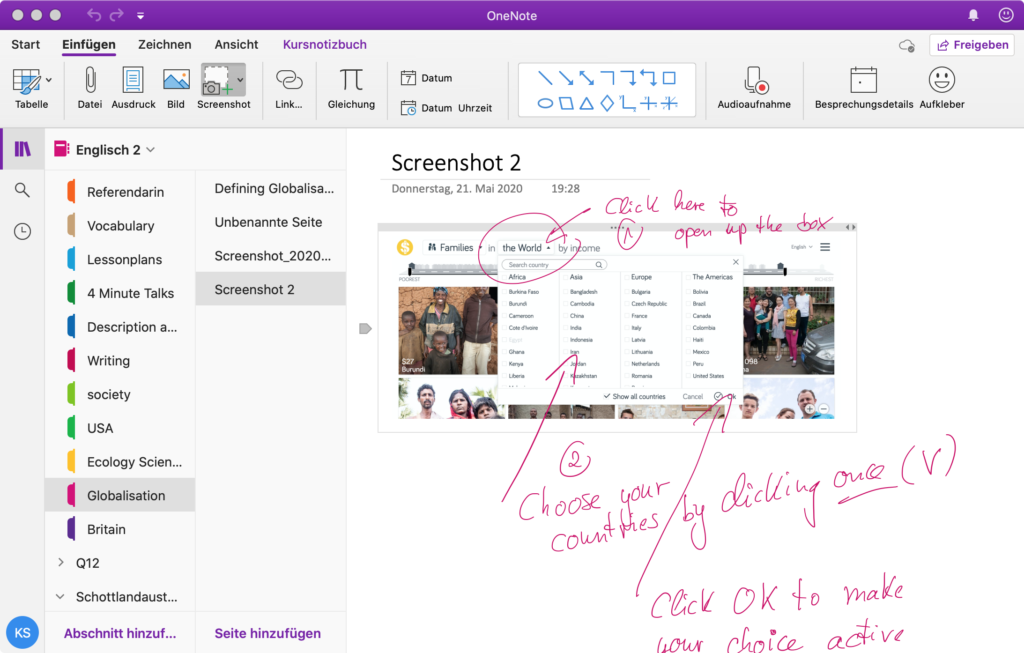
- Look at your results carefully.
- Note down which country you find on which of the 4 levels. Compare the monthly average each family has – take notes!
- Now choose one family on each level from different countries and look at details about their life: Find out about what their dream is by clicking on the picture.
- Now visit a home on each level their is in the same country and compare: living room – nicest shoes – toilet paper – drinking water – phone – child room – car
- Finally look at three different family homes from level 4 (different countries). Compare the following: front door – sitting area – car – phone – play area – shower – washing clothes
Finally choose one picture for a detailed description!
You are finished for this week – see you on Monday!
May 20th 2020 – Lesson 3 of split class training
Today I would like you to do a little more vocab revision and listen to a global news podcast.
Do you know these words? Check your knowledge!
Here is the link: https://www.bbc.co.uk/programmes/p08dk2tc
Write down 10 things (information) from the podcast. Note down 6 new words and check them.
Now write a short statement (what is it? how do you think about it? what is your conclusion?) about one of the aspects dealt with in the podcast.
That is it for today. See you Friday.
May 19th 2020 – Lesson 2 of split class training
Today I want you to revise yesterdays vocab exercises. How far did you get with the text? It is quite complex, so you can finish that off if you got stuck. I want you to look at a graph and write about it. Then you watch a video clip.
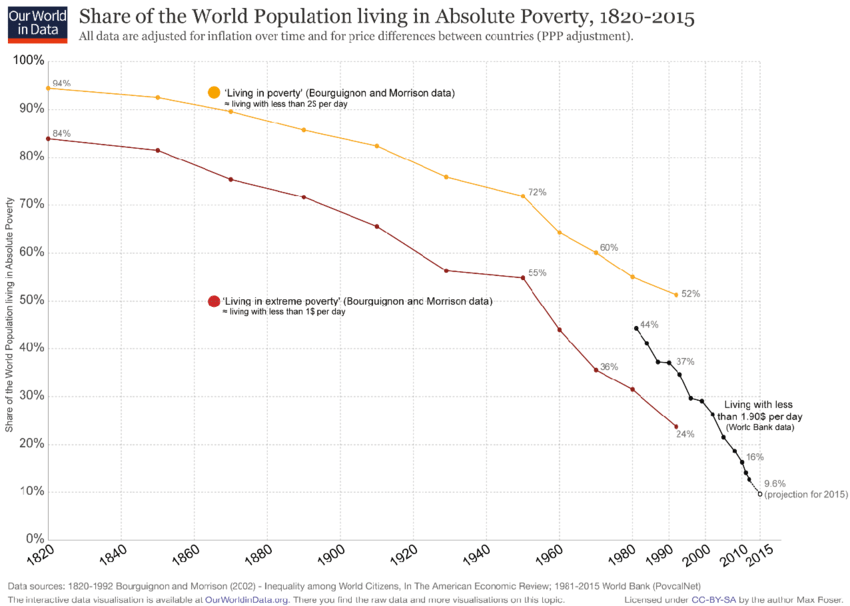
Describe the changes that have taken place over the last 200 years.
Now watch this video in which Anna Rosling-Rönnlund presents the idea of „Dollar Street“:
https://www.gapminder.org/videos/everyone-lives-on-dollar-street/
That is it for today. See you here tomorrow.
May 18th 2020 – Lesson 1 of split class training
Today you deal with a text and answer two questions, you do some vocab revision and an exercise of grammar/language. After that you should work on your presentation as it is due next week.
Now, we start with vocab:
In the following exercise you need 8 of the words you have just used in the recent one. The challenge is to use the correct form as well.
Now please open or print the following document and read it. Mark unknown vocab and check it online. Then answer the two questions.
Questions:
- Show how and why poverty has declined worldwide since the 1990s.
- Explain whether it is likely that the ongoing progress will continue.
And finally here is an exercise working on language and style:
If you have time left (10 minutes?) you can focus on your presentation for next week.
That is it for today, see you tomorrow.
- Now, you are supposed to write an argumentative text about battery-powered cars.
- Please use as much help to prepare for your text as necessary.
- All the information about how to write your text (of about 250 words) you find on pages 198/199 in your book. There are cross-references to the skill pages, too. Please consult these as well!
- I give you a number of links for pages here on which you can find further helpful content – as you have more time on your hands than usual I advise you to take your time and read a lot, take notes and in this way improve your English!
- https://www.solarreviews.com/blog/10-pros-and-cons-of-electric-cars
- https://www.autotrader.com/car-tips/electric-cars-benefits-and-disadvantages-208155
- https://www.theguardian.com/sustainable-business/2017/aug/10/electric-cars-big-battery-waste-problem-lithium-recycling
- https://www.weforum.org/agenda/2019/03/the-dirty-secret-of-electric-vehicles/
You can use these links to gain more information and enlarge your knowledge.
Obviously you should have a look at the different sources – there might be different interests and positions behind. Take that into account.
And of course, you can do your own research – but be aware which pages you consult!
Rules for submission of your essay:
- Please submit only pdf.files
- Name your file in the following way:
- second name first name topic version 1 e.g. Mayer Max battery powered cars v1
- Submit until Friday March 20th 2020 6 p.m.
Submit your argumentative essay:
March 20th 2020 – Info and Tasks
Welcome back here – I hope you are all okay. It has been a week since we have all been banned from school and are stuck at home.
By now, I think you might have understood why on last Friday, I asked you to write a diary – things are changing quite quickly and dramatically, at least for many people, and we don’t know what is to come yet.
So two tasks remain on a regular basis:
- Keep a diary and make an entry every day – if you have not started yet, do so today! Maybe you can resume changes that happened in your life over the past week. A diary is something personal, so that is what you do: you decide what goes in there – thoughts, feelings, a list of what you ate, watched, read, listened to, things that happened around the world, in Europe, in Germany, in Bavaria, in Traunstein, in your neighbourhood, at home, the news you watched, the fake news you found out about, the new idea that came into your head, the fear you feel, the annoyance, what makes you upset, your anger, the people you talked to, who you start admiring – your choice, make it your own and make it something you cherish. And of course you decide about the style: is it a notebook, do you write on squared paper, online, in a word document, do you make it a podcast series, or do you videotape your regular entries, again: your choice – but: do it!
- Do research on your film/book and work on a presentation – your presentation is supposed to be a 10-minute-one including: plot (2 minutes)/ definition of genre (1 minute)/ detailed analysis of typical elements of the genre (3 minutes)/ example and explanation (4 minutes). More to come soon…
For today: Here is an audiofile which you listen to, please. It takes about half an hour and touches on three different topics. Sit down, take something to write and take notes about the most important aspects you learn from the audiotext.
Secondly: After you have done that go to your books on p. 210 and read the text. Do exercise 5 and 7;
Additional: If you feel you want to do something „basic“ you can go to page 216 and do exercise 3.
Here I have a collection of links for inspiration – maybe you find something you like.
https://www.thisamericanlife.org/513/129-cars
https://fm4.orf.at/radio/stories/fm4morningshow/
Please return here on Monday! Take care of yourself!
March 23rd 2020 – Tasks
Welcome back and good morning. I hope you are well!
Today, we start on a new topic. You can guess…
And as we start on something new – I want you to keep and enlarge a vocab list (it can be an exercise book or a document)!
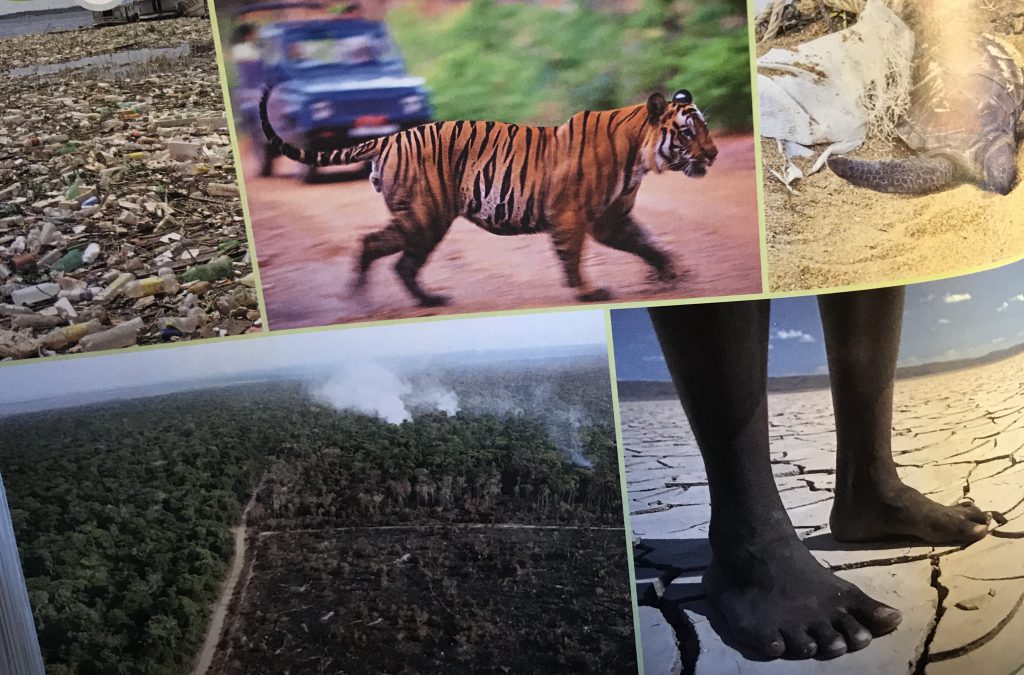
Look at the photos and state which ecological problems they refer to.
Make a list!
- Go to page 187 in your books.
- Read the first text termed Consequences of exploitation of natural resources.
- Look up words you do not understand.
- https://dict.leo.org/englisch-deutsch
- Compare the aspects on your list to the ones mentioned in the text.
- Add further aspects (from the text) to your list.
Tomorrow you will find a model answer here – you can then compare to your results.
You will now watch two videos on certain aspects of the general topic.
Video 1: deforestation
Answer these questions:
- What are commercial forests?
- What problems does Paloma Hannonen mention?
- When does Finland want to become carbon-neutral?
- What suggestions does Terhi Lehtonen make?
- Why does Paloma Hannonen think logging is generally harmful?
Watch the video once more. What do these terms mean? Write them down into your vocab list!
timber – logging – to sound the alarm – lumber industry – incentives – clear cuts
Video 2: Golden monkeys in Rwanda
This is a short and easy video. Write down vocabulary that is helpful in the context.
This was it for today. Until you tomorrow. Keep it up!
March 24th 2020 – Tasks
Good Morning! I hope you are fine.
First of all here is a list with all the ecological issues you might have noted down.
You will see there are a lot of words highlighted in yellow.
- Check the meaning in the online dictionary. https://dict.leo.org/englisch-deutsch/
- Check out the pronunciation as well (use the little „play-button“ in front of the English word!)
- Take all the important words into your vocab-list.
Secondly, please go back to your books, p.187.
- Read the second text („Responsibility to preserve nature“).
- Look at the two pie charts and think about what they tell you.
- Now do the following task:
After finishing think about whether you find the information in those pie charts convincing or not. Consider your reasons.
You can check arguments for either side here:
Again you see highlighted words in yellow – and as before:
- Check the meaning in the online dictionary. https://dict.leo.org/englisch-deutsch/
- Check out the pronunciation as well (use the little „play-button“ in front of the English word!)
- Take all the important words into your vocab-list.
Finally for today:
Watch this little lecture video about carbon.
Note down as many words as you can so you are able to revise and use those if you talk about the natural process!!!
Take care and talk to you tomorrow!
March 25th – Tasks
Good morning, guys! I hope you are well!
Now, today, we will slow down a little but I still want you to do two things:
First of all, here is a list with vocabulary from the carbon-lecture. There are words highlighted in yellow which you should cross-check in the online-dictionary.
Secondly, I ask you to read Margaret Atwoods text „Time capsule found on the dead planet“ in your books on page 191.
Do exercise 7 (analysis)!
That is it for today. Talk to you on Friday!
March 27th – Tasks
Welcome back for the final tasks of this week!
Just a short note on your essays: I am currently busy correcting your essays and they will return to you via email if you have sent me your address.
Today’s English lesson has two parts – you work with a video and secondly you do some language training (book).
Before you watch the video do the following:
- Take a piece of paper and in the middle write down the word „plastic“.
- Now write down the first word
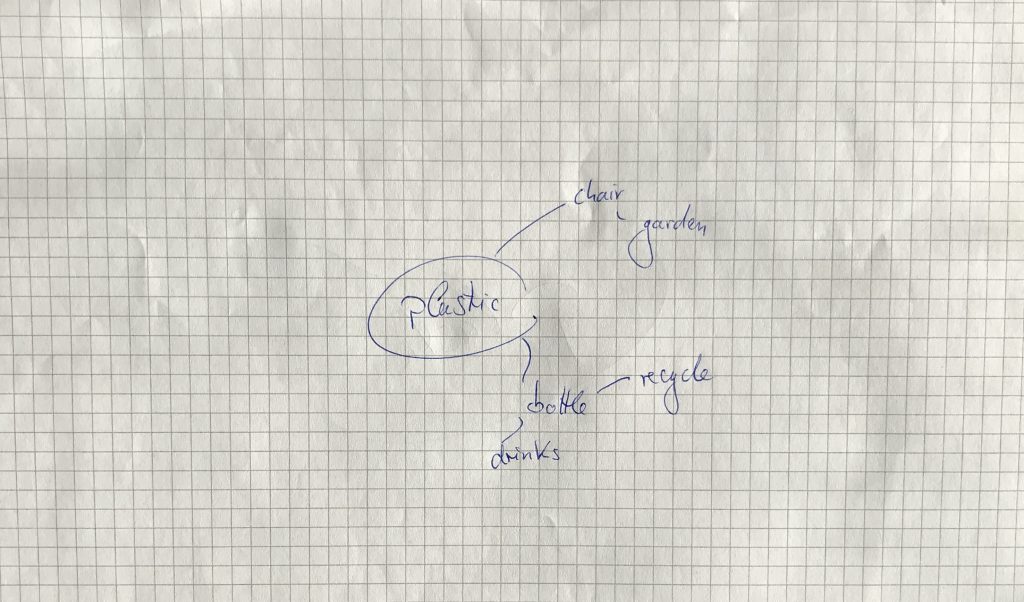
Take your exercise book or something else to write. Then watch the video by using the link: https://youtu.be/_6xlNyWPpB8
After watching for the first time: Write down roughly which way each of the three bottles takes.
Now watch a second time and interrupt the video to answer the following questions:
- What are the „heroes of the story“ made up of?
- What happens to the bottles after they have been filled with „sweet bubbly liquid“ (6 steps)?
- How does the „harmful stew“ (leachate) develop?
- How long does it take bottle 1 to decompose?
- Bottle 2: Note down the steps of its journey.
- What are the dangers bottle 2 creates?
- what makes the fate of bottle 3 so different?
Second part of the lesson:
- Go to page 192 in your books.
- Do exercise 1 and 2a in written form.
- For exercise 3 you can just write down the correct combination of number and letter (1A).
- Send an image of your completed work to my email-address so I can see you have done your exercises!
Some suggestions for you to spend quality time differently:
- Listen to one of the numerous BBC-podcasts (like the global news podcast)
- Watch one of the many live-concerts broadcast by 3sat
- Walk through one of the many museums that offer virtual walks at the moment (Lenbachhaus, Metropolitan Museum of Art, Louvre,…
Take care and have a good week-end. Please return here on Monday, preferably at 10.15!
March 30th – Tasks
Welcome back to the final week before Easter holidays!
Today there are two tasks.
First you can download and print the solutions for two of last weeks tasks. In these solutions you find highlighted vocab which you should note down and crosscheck as you have done before! There are 32 words altogether.
Secondly you please prepare the mediation task on p. 193 in your books. Please do the following:
- Go to page 338 in your books first and work through the mediating skills.
- Note down what you realize is the most important aspect for you to remember.
- Do steps 1-3 now.
Take care and please return here tomorrow, preferably at 12.05!
March 31st – Tasks
Today – no surprise: Please write the mediation you have prepared. Return here tomorrow morning for further information.
April 1st – Tasks
Please crosscheck your mediation. Use the file to see if you have got all necessary information.
April 3rd – Tasks
Today is Friday and the last day before holidays start. So for those ones who have actually worked these three weeks, today you could sit down and revise all the new vocab.
As a help to test yourself try to write down the German meaning for these words first:
- to accelerate
- ravaged
- demand
- imminent
- versatile
- lubricant
- combustion
- depletion
- live-stock farming
- summit
- ambitious
- to perceive
- to relinquish
- doom
- crops
And now the other way around:
- anfällig, empfänglich
- Verzehr, Genuss
- mittelmäßig
- unausweichlich
- etw. bewältigen, anpacken
- Zersetzung, Verfall
- Abfallentsorgung
- unangemessen, mangelhaft
- Dürre, Trockenheit
- elektrische Leitfähigkeit
- Sträflichkeit
- bevorstehen, drohen
- Hungersnot
- selbstbestimmt
- bewahren
Now, have a nice two-week break and we hopefully see each other on Monday April 20th 2020!
Take care!